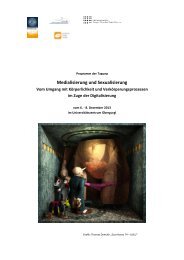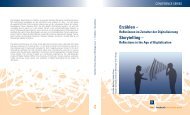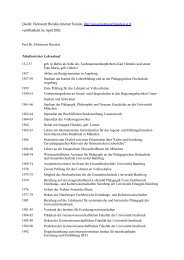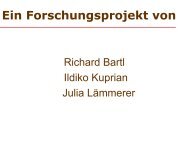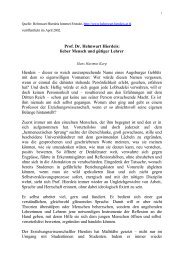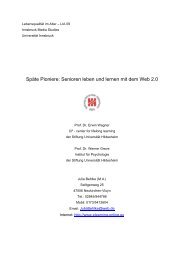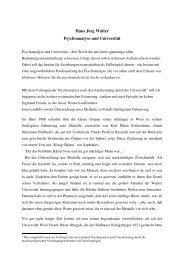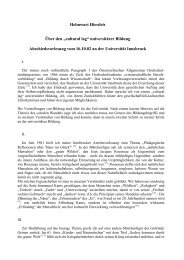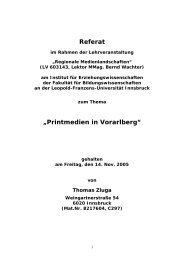Download pdf - Universität Innsbruck
Download pdf - Universität Innsbruck
Download pdf - Universität Innsbruck
Sie wollen auch ein ePaper? Erhöhen Sie die Reichweite Ihrer Titel.
YUMPU macht aus Druck-PDFs automatisch weboptimierte ePaper, die Google liebt.
106 Julia Rone<br />
Within this general context, the present paper tries to examine how democratic are the<br />
very web sites that claim to be victims of censorship. Does sharing culture lead to an open<br />
culture of sharing? Are there people who are excluded from the territory of the commons?<br />
As a theoretical background we have counted on the writings of Richard Stallman on free<br />
software, and those of Lawrence Lessig on free culture; and also the theory of the common<br />
as developed by Michael Hardt and Toni Negri in The Multitude. We will try to examine<br />
how these ideas are inscribed in the specific Bulgarian context, how they are being reinterpreted,<br />
refuted in practice, or simply (but dangerously) abused as mere rhetoric.<br />
Just to begin with, let us elaborate briefly on the theory of the common. Hardt and Negri<br />
pay great attention to the hegemonic role of immaterial labor, which can also be considered<br />
as biopolitical labor as what is produced is the social life itself. Capital remains external<br />
to the process of production; it extracts rent and acts as a sort of parasite, if we use the<br />
idea of Michel Serres. But the very externality of capital leads to the increasing autonomy<br />
of labor and the creation of democratic network structures which can be used against it.<br />
The main concept proposed by Hardt and Negri is the ‘multitude’: an open expanding<br />
network in which all differences are expressed freely. Every participant in the network is<br />
connected to all others, while remaining different, retaining his/her singularity. This type<br />
of decentralized network which produces the common is the way to the desired absolute<br />
democracy (Hardt & Negri, 2004). We can trace how the ideas of the FLOSS movement<br />
combine with autonomist Marxism in order to produce a vision of an open source collaborative<br />
society. The proposed theory has its critics, starting with Slavoj Zizek, who claims<br />
that democracy by definition is never absolute – it always has an element of elitism. We<br />
should not forget as well that power and capital are also organized in network structures<br />
and Hardt and Negri are rather silent about how we can overthrow them (Zizek, 2005).<br />
Another very provocative critique can be found in the book Animal Spirits: Bestiarium of<br />
the Commons by Mateo Pasquinelli, in which the author exposes the bodily animal passions<br />
that form the basis of immaterial production. Rarely can we find a stronger competition<br />
than the one observed in the production of the commons. It is enough to think, for<br />
example, of the hyper ego of artists and academics. The paradox of the commons is best<br />
described according to Pasquinelli with the joke: “A friend of mine stole my idea for a<br />
book on Creative Commons” (Pasquinelli, 2008, p.122). It should also be emphasized that<br />
the production of the digital commons has its dark sides. The most quoted examples for<br />
sharing content are always Wikipedia or YouTube, but a remarkable amount of the content<br />
online is either porn or violence. This does not mean that we should reject the revolutionary<br />
potential of the commons, but just that we should be more aware of what we are dealing<br />
with (Pasquinelli, 2008). The potential of the commons is so revolutionary, that while<br />
calmly counting on its carnival creativity, we might be unpleasantly surprised to reveal its<br />
more cruel and unpleasant face.



